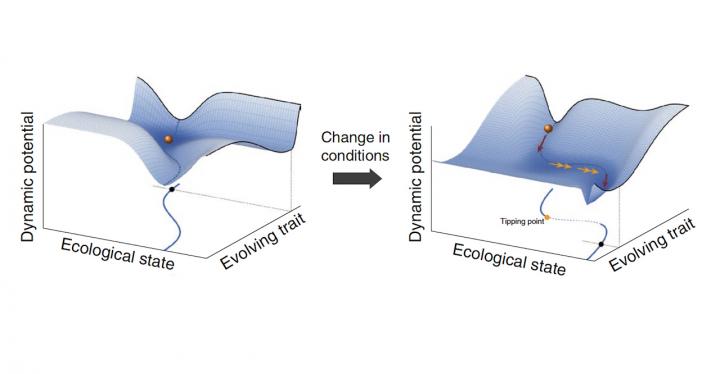
Credit: André de Roos
When a grassland becomes a desert, or a clearwater lake shifts to turbid, the consequences can be devastating for the species that inhabit them. These abrupt environmental changes, known as regime shifts, are the subject of new research in Nature Ecology & Evolution which shows how small environmental changes trigger slow evolutionary processes that eventually precipitate collapse.
Until now, research into regime shifts has focused on critical environmental thresholds, or “tipping points,” in external conditions — eg when crossing a certain temperature threshold triggers a sudden shift to desertification. But the new model by Catalina Chaparro-Pedraza and Santa Fe Institute External Professor André de Roos, both at the University of Amsterdam, reveals how a small change in the external environment, with little immediate impact, can induce slow evolutionary changes in the species that inhabit the system. After what the researchers call a “considerable delay,” wherein species slowly evolve a new trait or behavior over generations, the regime shift manifests as a delayed reaction.
“Instead of looking for a straightforward relationship between environmental tipping points and ecosystemic collapse, our work brings evolution into the picture,” Chaparro-Pedraza explains. “Even though the outcome is the same, we think it’s critically important to map out different paths that lead to regime shifts so we can predict and eventually prevent them.”
In their model, the researchers demonstrate how these evolution-induced, delayed regime shifts arise in communities of salmon. At different stages of their lives, salmon live in freshwater and marine ecosystems, which both have entirely different biological communities. When a slight change in the marine environment reduces the mortality exposure of the saltwater salmon population, the immediate effects are minor. However, it initiates an evolutionary process that slowly drives individual character traits, like the optimal body size for migrating from the river to an open ocean, to a critical threshold where a regime shift occurs. Remarkably, this regime shift produces dramatic changes in community composition in both the freshwater and marine communities simultaneously, even though nothing changed in the environmental conditions of the freshwater community.
Understanding the role of evolutionary processes in regime shifts could also shed light on other complex, interdependent systems. De Roos and Chaparro-Pedraza also examined data from the 2008 financial crisis, which, according to de Roos, “seem pretty much in line with the adaptation-induced regime shift we report in this paper.” In this example, the 2008 crash can be seen as the delayed regime shift. The deregulation of the financial system in the 1970s and 1980s would be the environmental change with a negligible immediate effect, and the documented trend of banks changing their debt-to-asset ratio would be analogous to the evolutionary process triggered by the environmental change.
“Regime shifts don’t just happen in ecosystems,” says de Roos. “They also appear in systems like stock markets. Our model shows the evolutionary mechanism by which a sudden change — like an ecosystem or financial collapse — may be the result of a small environmental change in the distant past.”
###
Media Contact
J Marshall
[email protected]
505-930-6131
Original Source
https:/
Related Journal Article
http://dx.




